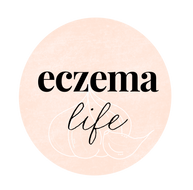Eczema and dry skin in winter (the best eczema cream and more!)

By Bonnie.
If you’re living in Australia, I am sure you have noticed that summer has gone and cooler weather is officially here. Hello autumn! Things that make autumn wonderful, such as stunning blue skies, snuggling up in bed listening to howling winds, dusting off the flannels and getting the heaters out can cause another challenge for us eczema warriors. The change in seasons makes our skin become so porous – when applying moisturiser, it's soaked up in seconds!
With the change in temperature, I noticed a dramatic and frustrating change in my skin (and non-eczema sufferers have been complaining too)! My skin has become tight, so dry, flaky, red and sore. If yours has too, do not despair. Below are some tips to assist with an effective autumn and winter eczema skincare plan, so that you can maintain healthy skin. I ‘upped my ante’ with my skin routine and have seen improvements in my skin texture.
Let's start with eczema creams...
You’ve heard it before, but upping your moisturising application of eczema creams during the cooler months is so important to keep your skin extra hydrated and flake-free. I know this can be hard as it is cold and the cream is cold!
I love Skin Friend 24-hour Rescue Balm and Wonder Zinc.
24-Hour Rescue is perfect for treating super dry, flaking, cracked and rough skin, and works for at least 24 hours! I like to put it on before bed and I find on waking my skin feels hydrated but not greasy (you know what I mean), soft and smooth. This eczema cream is suited for sensitive skin, scars, itchy skin and wrinkly bodies. My friend who does not have eczema also really likes and uses this cream as she tells me it makes her skin feel softer and she loves that it is fragrance-free.
Wonder Zinc is my other go-to. It not only stops that pesky itch, it heals scratches and wounds too - fast! I love the ingredients (Kakadu Plum, Organic Camellia Oil and Elderberry) because they are so gentle on sensitive skin. The zinc doesn't make me look like I'm plastered in cream either. The natural non-nano zinc rubs in oh so nicely.
Eczema foods
Eating the right foods to support your eczema (and skin) is essential, and particular ingredients (that are also eczema-friendly) are like superheros when it comes to supporting dry winter skin.
Best eczema foods
- Flaxseed oil is wonderful for eczema and dry skin as it has a rich content of anti-inflammatory omega 3 oils to promote healthy skin. Flaxseed oil is more refined than whole flaxseeds so it contains fewer salicylates and amines and more beneficial oils, including 57 percent omega-3 fatty acids. If you have eczema, this food (or another omega-3 rich oil like hempseed oil) should be an essential part of any eczema diet. I like to add a teaspoon to my morning smoothie or drink our Pear and Flaxseed Dry Skin Remedy.
- Fish is an amazing eczema food, especially for people with dry skin as it's full of omega 3 fatty acids that strengthen skin cells, which helps to retain moisture. Note: It is important to favour eczema-safe fish that is low in mercury (salmon, sardines and small white fish such as flathead).
- If you are not sensitive to nuts... Raw unsalted cashew nuts are packed with magnesium, zinc, iron, and phosphorous. They contain high amounts of proteins and antioxidants including selenium which supports healthy, glowing skin. Try our tasty Cashew Nut Butter recipe. Note: Raw cashews are low in amines, but if you have histamine intolerance avoid all nuts as they can raise histamine levels in the body.
For more great eczema foods and recipes check out our recent blog post here.
How to bathe with eczema
Lukewarm water is the key...
I know it is far too tempting to take a long, hot, steamy shower, but your skin will be much happier with a 5-10-minute lukewarm shower or bath as it's much kinder on eczema.
Also, if you have eczema try to avoid using excessively hot water when washing your hands: if the water causes your skin to turn red, it’s too hot! We all wash our hands now more often these days so this is really important. Research shows that washing your hands in cooler water can be just as effective at removing germs as warm water and it is less irritating to eczema.
And once you've dried off, apply your favourite moisturiser.
Eczema and clothing
Some fibres, such as wool, nylon, and others, can irritate skin and cause eczema. They also may cause overheating, which can lead to an ‘itch’ flare-up.
Try to dress in breathable materials, such as cotton or bamboo, and avoid wearing too many layers. Also, eliminate unnecessary layers on your bed and make sure bed linens are made from breathable fabrics as well. Find out more about the right fabrics for eczema sufferers here.
Drink plenty of water
An obvious but important point! Often, we don’t feel like drinking water when it's not hot, but please do! Keeping your body hydrated will help keep your skin hydrated. Make water your choice of drink and try to have at least eight glasses of water per day, this will help hydrate your skin. I carry a water bottle with me at all times.
Eczema-friendly tea
One of my favourite cooler weather rituals is to curl up on the couch with a good book, my fleecy blanket, and a hot drink…without the itch! Traditional teas, coffees, and hot chocolates are full of itch promoting ingredients (caffeine is the worst) but our Carob Mylk tea recipe is a delicious chocolate-free substitute that is nourishing to your skin. Carob is a rich source of calcium and it's salicylate free. Find the recipe here.

Much love (and happy skin)
xx Bonnie
Shop the Story


